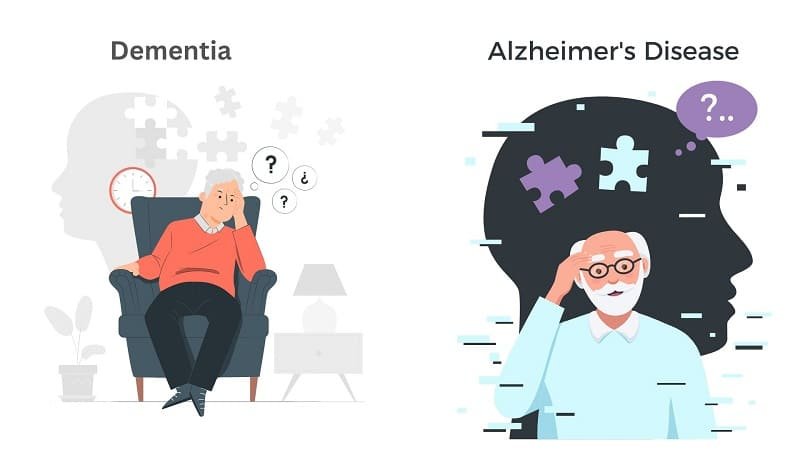Introduction:
Alzheimer’s disease and dementia are terms often used interchangeably, but they refer to distinct conditions with some overlapping characteristics. Understanding the differences is crucial for individuals, caregivers, and those navigating the complexities of neurodegenerative disorders.
Alzheimer's Disease:
- Alzheimer’s is a specific and progressive brain disorder that affects memory, cognitive function, and the ability to carry out daily activities.
- It is the most common cause of dementia, accounting for approximately 60-80% of dementia cases.
- Alzheimer’s is characterized by the accumulation of abnormal protein deposits in the brain, including beta-amyloid plaques and tau tangles, leading to the death of brain cells.
Dementia:
- Dementia is an umbrella term for a range of cognitive impairments that interfere with daily life. It is not a specific disease but a syndrome resulting from various disorders affecting the brain.
- Dementia involves a decline in memory, communication, problem-solving, and the ability to perform routine tasks.
- Alzheimer’s is a type of dementia, but other conditions such as vascular dementia, Lewy body dementia, and frontotemporal dementia also fall under this umbrella.
Is Alzheimer’s and Dementia Same
Underlying Causes:
- Alzheimer’s has distinct pathological changes in the brain, such as plaques and tangles.
- Dementia encompasses a variety of conditions with different underlying causes, including vascular issues, Lewy bodies, or frontotemporal lobe degeneration.
Progression:
- Alzheimer’s is a specific, progressive disease with a predictable trajectory.
- Dementia, being a syndrome, can progress differently depending on the underlying cause. Some forms of dementia may progress more rapidly than others.
Symptoms:
- Both Alzheimer’s and dementia exhibit similar symptoms initially, such as memory loss, confusion, and difficulty with daily tasks.
- Alzheimer’s symptoms tend to progress predictably from mild to moderate to severe stages, while other forms of dementia may have more varied symptomatology.
Prevalence:
- Alzheimer’s is the most prevalent cause of dementia, but not all dementia cases are attributable to Alzheimer’s.
- Vascular dementia, for example, is associated with impaired blood flow to the brain and is another leading cause of dementia.
Difference Between Alzheimer's Disease and Dementia
| Aspect | Alzheimer's Disease | Dementia |
|---|---|---|
| Definition | A specific and progressive brain disorder affecting memory and cognitive function. | An umbrella term for a range of cognitive impairments resulting from various brain disorders. |
| Underlying Causes | Accumulation of beta-amyloid plaques and tau tangles in the brain. | Various causes including vascular issues, Lewy bodies, and frontotemporal lobe degeneration. |
| Progression | Follows a predictable trajectory from mild to moderate to severe stages. | Progression varies depending on the underlying cause; may not follow a specific pattern. |
| Symptoms | Memory loss, confusion, and difficulty with daily tasks. | Varied symptoms including memory loss, communication difficulties, and impaired problem-solving. |
| Prevalence | Accounts for 60-80% of dementia cases. | Includes various causes such as vascular dementia, Lewy body dementia, and frontotemporal dementia. |
Conclusion:
In summary, while Alzheimer’s and dementia are related, they are not synonymous. Alzheimer’s is a specific type of dementia with distinct pathological features, while dementia encompasses a broader category of cognitive disorders. A comprehensive diagnosis by healthcare professionals is essential for appropriate treatment and care planning. Understanding these differences empowers individuals, families, and caregivers to navigate the challenges of neurodegenerative disorders more effectively.
Faq Related to "Is Alzheimer’s and Dementia Same"
No, Alzheimer’s disease and dementia are not the same. Alzheimer’s is a specific and progressive brain disorder, while dementia is an umbrella term for a range of cognitive impairments resulting from various brain disorders.
The primary difference lies in specificity. Alzheimer’s is a distinct type of dementia characterized by specific pathological changes in the brain, whereas dementia encompasses a broader category of cognitive disorders with different underlying causes.
Initially, symptoms such as memory loss and confusion may appear similar. However, Alzheimer’s symptoms tend to progress predictably from mild to severe stages, while other forms of dementia may exhibit varied symptomatology depending on the underlying cause.
Alzheimer’s is a type of dementia, so it always involves dementia symptoms. However, not all dementia cases are due to Alzheimer’s. Other conditions, such as vascular dementia or frontotemporal dementia, fall under the umbrella of dementia without being Alzheimer’s.
Dementia itself is a syndrome and not a specific disease, so the term “cure” may not apply universally. The approach to management and treatment depends on the underlying cause. Some causes of dementia are reversible, while others may be progressive and managed symptomatically.
Yes, Alzheimer’s disease is the most common cause of dementia, accounting for approximately 60-80% of dementia cases. However, other conditions, such as vascular dementia, Lewy body dementia, and frontotemporal dementia, also contribute to the overall prevalence of dementia.
While it’s rare, individuals can have multiple types of dementia simultaneously. This is known as mixed dementia and occurs when a person has brain changes characteristic of more than one type of dementia, such as Alzheimer’s and vascular dementia.
While there is no cure for Alzheimer’s, there are medications and interventions that may help manage symptoms. Treatments for dementia depend on the underlying cause, and supportive therapies, medications, and lifestyle modifications are often considered.
Differentiating between types of dementia requires a comprehensive diagnosis by healthcare professionals. Brain imaging, cognitive assessments, and medical history evaluation are some of the tools used to identify the specific cause of dementia.
Some risk factors for dementia, such as cardiovascular health and lifestyle choices, can be modified to reduce the risk. However, not all forms of dementia can be prevented, as genetic and age-related factors also play a role. Adopting a healthy lifestyle may contribute to overall brain health.










